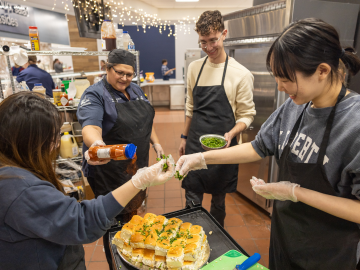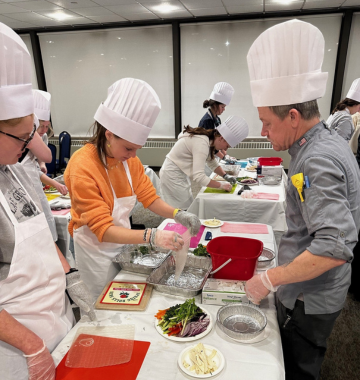Several Sodexo campus dining programs are working to increase students’ food agency – the ability to obtain and prepare their own meals – by providing cooking classes on campus.
Senior Area Executive Chef Sarah Falls has provided several cooking classes to students at Liberty University, in Lynchburg, Va. While the classes are sometimes with high school students, she often holds classes for Liberty students interested in learning how to prepare their own food. Each class will have a theme.
“Typically, I do something seasonally related,” Falls said. “During the Fall, I did ways to utilize Thanksgiving leftovers, and for Christmas we did easy appetizers. In Spring, we did shrimp risotto and a strawberry burrata crostini.”
said. “During the Fall, I did ways to utilize Thanksgiving leftovers, and for Christmas we did easy appetizers. In Spring, we did shrimp risotto and a strawberry burrata crostini.”
Students work together on different aspects of the meal – appetizer, entrée and dessert – and learn about timing, knife skills, ingredients and preparation. While the 2-3 hour class is free, space is limited.
“We post a sign-up sheet online and it fills up in less than 10 minutes,” Falls said. She added that many of the students in the class are living in places where they have their own kitchens, so knowing how to prepare their own meals is important.
“It’s a life skill that’s really important - for you to learn how to cook,” she said. “If you don’t, it’s going to cost you more.”
Sodexo has a cooking class program called Kitchen Academy that several campus dining programs use to teach students culinary skills. At SUNY New Paltz, Campus Executive Chef Matthew Hill said they’ve done a few of the academy classes, which include lessons on things pasta-making, grilling, and preparing a meal for one. Their most recent class, “Chop Like a Chef,” taught students knife skills and basic food safety as they made vegan spring rolls.
“The students were learning knife skills for all the vegetable cuts,” Hill said. “We taught them how to julienne, chiffonade, and how to assemble the rolls. They made 2-3 each for themselves and had some to take home.”
Students in the program also received a cut-glove, chef hat, recipes, and certificates to take home with them.
chef hat, recipes, and certificates to take home with them.
Area Executive Chef Aaron Furtner said there are two basic goals for these cooking classes.
“On the student side, we’re able to teach them real life skills,” Furner said. “We’re helping students as they transition to moving off campus and cooking for themselves. Also, we’re creating an environment that is transparent with our student base, and allowing them to see and work with key leaders at our dining programs.”
Cooking for oneself can also often be healthier, which is an aspect many of the dining programs emphasize in their cooking classes. Hill said New Paltz Campus Dietitian Kelly Pearson often works with groups on campus to bring them to these classes to learn how to prepare healthy meals when they’re on their own.
At Lehigh University Dining in Bethlehem, Pa., Campus Dietitian Keri Lasky said a lot of the dietetic counseling she does with students is based on how to not just how to cook for themselves, but also how to do so in a healthy way.
Lasky recently led students in a Mindful cooking class that gave them hands-on experience making Greek black bean burgers, a tart cherry superfood shot, and Vegan edible cookie dough. She was helped by her team of Student Nutrition Ambassadors who plan a “Nourish Your Potential” event each month. For the class, the ambassadors came up with the menu, some talking points, helped set-up the event and assisted throughout the class.
It's important for students to learn cooking skills and tips now when they’re in college before they are out on their own, Lasky said.
“When students move off campus, it becomes a shock when they move off the meal plan and have to make meals for themselves,” Lasky said. “So it’s good for them to learn things like knife skills and time-saving cooking tips that can be useful.”
“In college students are away from home for the first time,” Resident District Manager Kristin Piazza said. “They’re starting their life now becoming adults. Whether it be us they’re relying on or learning life skills on their own, it’s a super important part of their education.”
